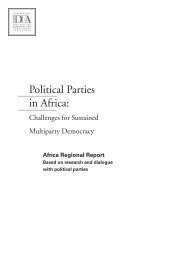Background Document - Danish Institute for Parties and Democracy
Background Document - Danish Institute for Parties and Democracy
Background Document - Danish Institute for Parties and Democracy
Create successful ePaper yourself
Turn your PDF publications into a flip-book with our unique Google optimized e-Paper software.
As soon as absolute monarchy came to an end, the liberal bourgeois class broke its<br />
alliance with the less privileged classes <strong>and</strong> grabbed power <strong>for</strong> itself. Running entirely<br />
counter to its egalitarian rhetoric, the bourgeoisie defined democratic citizenship<br />
in its own image, <strong>and</strong> reserved political rights <strong>for</strong> the educated <strong>and</strong> married man of<br />
means – the paterfamilias. And they called this model ‘universal suffrage’.<br />
The revolutionary left responded with socialism – the second great political ideology<br />
of modernity – which recycled the liberal criticism of the old regime, but with the<br />
emphasis on equality <strong>and</strong> fraternity rather than on individual liberty.<br />
The fact that both bourgeois liberals <strong>and</strong> socialists conceived of human rights as<br />
men’s rights prompted the emergence of feminism – the third great political ideology<br />
of modernity – with its dem<strong>and</strong>s <strong>for</strong> liberty, equality, <strong>and</strong> solidarity <strong>for</strong> both sexes.<br />
Feminist voices were raised in protest from the very outset of the democratic<br />
movements. Among the first was Abigail Adams (1744-1818), who was married to John<br />
Adams, one of the signatories of the American Declaration of Independence. When<br />
she saw the contours of the man’s rights discourse begin to take shape, she warned her<br />
husb<strong>and</strong> that a new rebellion loomed if women remained without legal rights:<br />
“I long to hear that you have declared an independency. And, by the way, in<br />
the new code of laws which I suppose it will be necessary <strong>for</strong> you to make, I desire<br />
you would remember the ladies <strong>and</strong> be more generous <strong>and</strong> favorable to them than<br />
your ancestors. Do not put such unlimited power into the h<strong>and</strong>s of the husb<strong>and</strong>s.<br />
Remember, all men would be tyrants if they could. If particular care <strong>and</strong> attention<br />
is not paid to the ladies, we are determined to foment a rebellion, <strong>and</strong> will not hold<br />
ourselves bound by any laws in which we have no voice or representation.” 2<br />
In France, the voice of protest was raised by revolutionary activist Olympe de<br />
Gouges (1748-93), who penned the first declaration of women’s rights, Déclaration des<br />
droits de la femme et de la citoyenne, in 1791. Here, she replaced the word ‘man’ from<br />
the Déclaration des droits de l’homme et du citoyen with ‘woman’ – <strong>and</strong> gave us an<br />
object lesson in just how patriarchal the famed original text is.<br />
Olympe de Gouges was also the first to gender the deprivation of rights by drawing<br />
parallels between the King, who deprives the people of their rights, <strong>and</strong> men, who<br />
deprive women of their human rights <strong>and</strong> tyrannise them:<br />
“Liberty <strong>and</strong> justice consist of restoring all that belongs to others; thus, the only<br />
limits on the exercise of the natural rights of woman are perpetual male tyranny;<br />
these limits are to be re<strong>for</strong>med by the laws of nature <strong>and</strong> reason.” 3<br />
It is worth noting that human rights in their original inception are founded in<br />
both a religious <strong>and</strong> a secular world view. In the Christian, American tradition they are<br />
God-given, while the secular, French tradition roots them in nature <strong>and</strong> reason.<br />
Likewise, it is important to emphasise that feminism pertains to political views<br />
that may be held by both genders. From the outset, men participated in the struggle<br />
<strong>for</strong> equal status, which is, after all, just another word <strong>for</strong> equality.<br />
One example is the French Enlightenment philosopher J. A. Condorcet (1743-94),<br />
who <strong>for</strong>warded the simple argument that human rights per<strong>for</strong>ce apply to all human<br />
beings. Rights that apply only to some sections of the population are special rights,<br />
group rights, or inherited privileges, which the revolution had set out to abolish.<br />
Rights awarded to wealthy white men can only be called human rights if poor people,<br />
coloured people, <strong>and</strong> women are not human beings.<br />
From around 1830, we may speak of an international women’s move-ment, driven<br />
2 History.com<br />
3 Duiker 2006, p. 499<br />
WOMEN IN POLITICS DANISH INSTITUTE FOR PARTIES AND DEMOCRACY PAGE 48
















